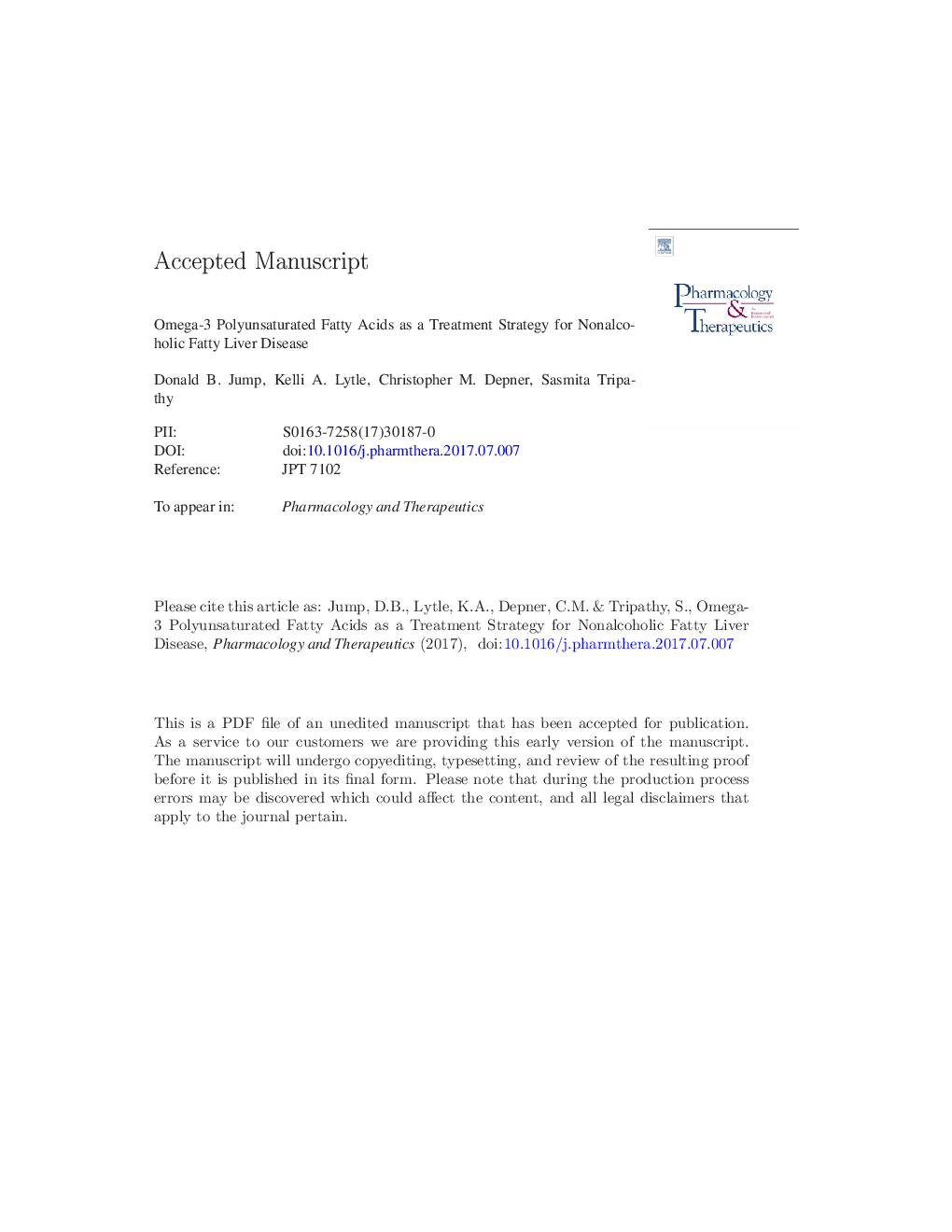| کد مقاله | کد نشریه | سال انتشار | مقاله انگلیسی | نسخه تمام متن |
|---|---|---|---|---|
| 8536976 | 1560924 | 2018 | 65 صفحه PDF | دانلود رایگان |
عنوان انگلیسی مقاله ISI
Omega-3 polyunsaturated fatty acids as a treatment strategy for nonalcoholic fatty liver disease
ترجمه فارسی عنوان
اسیدهای چرب غیر اشباع امگا 3 به عنوان یک استراتژی درمان برای بیماری کبد چرب غیرقرآل
دانلود مقاله + سفارش ترجمه
دانلود مقاله ISI انگلیسی
رایگان برای ایرانیان
کلمات کلیدی
ChREBPLDLRMUFAPPARNASCD36FADSMCDFXRNEFAAKT2collagen 1A1ECMmTORCATP citrate lyaseDNLCOL1A1γGTFABPElongaseELOVLACYLMlxNAFLDEPACOXEGFPI3KALAALTMMPACCERK1/2 - ERK1 / 2HCC - HCCγ-Glutamyl transferase - γ-گلوتامیل ترانسفرازAST - آسپارتات ترانس آمینازAspartate aminotransferase - آسپارتات ترانس آمیناز یا AST Alanine aminotransferase - آلانین آمینوترانسفرازcyclooxygenase - آنزیم سیکلواکسیژنازAtgl - اتگلde novo lipogenesis - از لیپوژنز جدیدnonalcoholic steatohepatitis - استاتو هپاتیت غیر الکلیacetyl coA carboxylase - استیل کولا کربوکسیلازα-linolenic acid - اسید α-لینولنیکEicosapentaenoic acid - اسید ایکوزاپنتانوئیکdocosahexaenoic acid - اسید داکوزاگزوائونیکFatty acid desaturase - اسید لاکتیک اسیدLinoleic acid - اسید لینولئیکfatty acid synthase - اسید چرب سنتازnon-esterified fatty acids - اسیدهای چرب غیر استرادیدهmonounsaturated fatty acids - اسیدهای چرب غیر اشباعFatty acid oxidation - اکسیداسیون اسید چربNonalcoholic fatty liver disease - بیماری کبدی چربی غیر الکلیARA - در حال حاضرDHA - دوکوساهگزائنوئیک اسیدMetabolic syndrome - سندرم متابولیکextracellular signal regulated kinase - سیگنال خارج سلولی kinase را تنظیم می کندcomparative gene identification-58 - شناسایی ژن مقایسه-58epidermal growth factor - عامل رشد اپیدرمیFAO - فائوFasn - فسادphosphoinositol-3-kinase - فسفونیوزیتول 3-کینازadipocyte triglyceride lipase - لیپاز تری گلیسرید آدفوسیتExtracellular matrix - ماتریکس خارج سلولیMatrix metalloprotease - ماتریکس متیل پروتئازایMETS - متسNash - نوشFatty acid binding protein - پروتئین اتصال دهنده اسید چربHepatocellular carcinoma - کارسینوم هپاتوسلولار(کارسینوم سلولهای استخوانی)cholesterol esters - کلسترول استرسlow density lipoprotein receptor - گیرنده لیپوپروتئین چگالی کم
موضوعات مرتبط
علوم پزشکی و سلامت
داروسازی، سم شناسی و علوم دارویی
داروشناسی
چکیده انگلیسی
Obese and type 2 diabetic (T2DM) patients have a high prevalence of nonalcoholic fatty liver disease (NAFLD). NAFLD is a continuum of chronic liver diseases ranging from benign hepatosteatosis to nonalcoholic steatohepatitis (NASH), cirrhosis and primary hepatocellular cancer (HCC). Because of its strong association with the obesity epidemic, NAFLD is rapidly becoming a major public health concern worldwide. Surprisingly, there are no FDA approved NAFLD therapies; and current therapies focus on the co-morbidities associated with NAFLD, namely, obesity, hyperglycemia, dyslipidemia, and hypertension. The goal of this review is to provide background on the disease process, discuss human studies and preclinical models that have examined treatment options. We also provide an in-depth rationale for the use of dietary Ï3 polyunsaturated fatty acid (Ï3 PUFA) supplements as a treatment option for NAFLD. This focus is based on recent studies indicating that NASH patients and preclinical mouse models of NASH have low levels of hepatic C20-22 Ï3 PUFA. This decline in hepatic PUFA may account for the major phenotypic features associated with NASH, including steatosis, inflammation and fibrosis. Finally, our discussion will address the strengths and limitations of Ï3 PUFA supplements use in NAFLD therapy.
ناشر
Database: Elsevier - ScienceDirect (ساینس دایرکت)
Journal: Pharmacology & Therapeutics - Volume 181, January 2018, Pages 108-125
Journal: Pharmacology & Therapeutics - Volume 181, January 2018, Pages 108-125
نویسندگان
Donald B. Jump, Kelli A. Lytle, Christopher M. Depner, Sasmita Tripathy,
